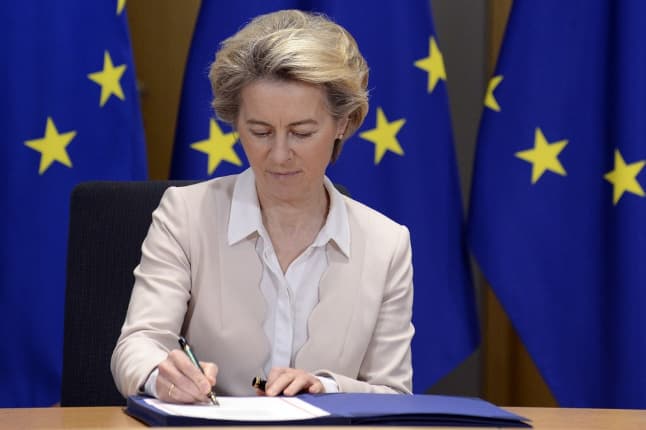'It's time to put Brexit behind us': EU chiefs sign trade deal with UK

EU chiefs Ursula von der Leyen and Charles Michel signed the post-Brexit trade deal agreed with Britain on Wednesday morning.
After that the EU-UK Trade and Cooperation Agreement was being taken to London, where UK Prime Minister Boris Johnson was to add his signature.
In a statement, the European Commission said the deal would be implemented on only a provisional basis, as there has not been time for the EU parliament to vote on it.
But, with the UK parliament due to ratify the text later on Wednesday, this should be enough to head off the threat of a no-deal divorce on January 1st.
? LIVE NOW: EU-UK Agreements signature in Brussels https://t.co/E4q0uwsL27
— Charles Michel (@eucopresident) December 30, 2020
"On January 1st we say 'Hello, Goodbye' to the United Kingdom," German Foreign Minister Heiko Maas, whose country holds the rotating EU presidency, said in a statement.
"With the end of the transition period, the United Kingdom will be effectively leaving the European single market and the customs union. At the same time, we will enter into our new comprehensive partnership."
"It has been a long road. It's time now to put Brexit behind us," tweeted European Commission President Ursula von der Leyen. "Our future is made in Europe."
Today, @eucopresident and I signed the EU-UK Trade and Cooperation Agreement.
Prime Minister @BorisJohnson will sign it later today in London.
It has been a long road. It’s time now to put Brexit behind us.
Our future is made in Europe. pic.twitter.com/fjybWryJNY
— Ursula von der Leyen (@vonderleyen) December 30, 2020
If Britain had left the EU single market at the end of the year without a trade deal, renewed tariffs and quotes would have damaged cross-Channel trade.
As it is, there will still be a return to a customs and regulatory border after a half-century of close integration, and some level of disruption, not least for Brits living in the EU and Europeans in Britain.
But both sides hope the deal, a hard-fought compromise after ten months of intense negotiations, will form a stable basis to build a new, looser partnership.
Comments
See Also
After that the EU-UK Trade and Cooperation Agreement was being taken to London, where UK Prime Minister Boris Johnson was to add his signature.
In a statement, the European Commission said the deal would be implemented on only a provisional basis, as there has not been time for the EU parliament to vote on it.
But, with the UK parliament due to ratify the text later on Wednesday, this should be enough to head off the threat of a no-deal divorce on January 1st.
? LIVE NOW: EU-UK Agreements signature in Brussels https://t.co/E4q0uwsL27
— Charles Michel (@eucopresident) December 30, 2020
"On January 1st we say 'Hello, Goodbye' to the United Kingdom," German Foreign Minister Heiko Maas, whose country holds the rotating EU presidency, said in a statement.
"With the end of the transition period, the United Kingdom will be effectively leaving the European single market and the customs union. At the same time, we will enter into our new comprehensive partnership."
"It has been a long road. It's time now to put Brexit behind us," tweeted European Commission President Ursula von der Leyen. "Our future is made in Europe."
Today, @eucopresident and I signed the EU-UK Trade and Cooperation Agreement.
— Ursula von der Leyen (@vonderleyen) December 30, 2020
Prime Minister @BorisJohnson will sign it later today in London.
It has been a long road. It’s time now to put Brexit behind us.
Our future is made in Europe. pic.twitter.com/fjybWryJNY
If Britain had left the EU single market at the end of the year without a trade deal, renewed tariffs and quotes would have damaged cross-Channel trade.
As it is, there will still be a return to a customs and regulatory border after a half-century of close integration, and some level of disruption, not least for Brits living in the EU and Europeans in Britain.
But both sides hope the deal, a hard-fought compromise after ten months of intense negotiations, will form a stable basis to build a new, looser partnership.
Join the conversation in our comments section below. Share your own views and experience and if you have a question or suggestion for our journalists then email us at [email protected].
Please keep comments civil, constructive and on topic – and make sure to read our terms of use before getting involved.
Please log in here to leave a comment.